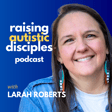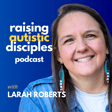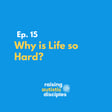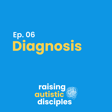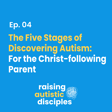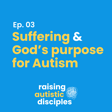Critique of Autism Cure Beliefs
00:00:00
Speaker
Yeah, people in the world that are just claiming, if you pray hard enough and long enough, autism will just disappear. That's not a proper view of how the Lord gives and takes away, or the disability of autism is something to be cured and not something to be discipled.
Raising an Autistic Child in Faith
00:00:21
Speaker
Hello there, friends, and welcome to episode two of Raising Autistic Disciples. Today, I'm talking with my wonderful husband, Colin, about the image of God and what we've experienced in the last couple years of raising our son, Graham, who is autistic and who has taught us so many things, not only about how God created him in his image, but also what he's teaching us through raising an autistic son. And so I hope you find this conversation helpful.
00:00:53
Speaker
Thanks for being on the podcast. Yo. The Rad Podcast. The Rad Podcast. Remember when we came up with it? I don't. You don't? I don't remember either, but I thought it was, we went through several terrible names. We did. And then we landed on Raising Autistic Disciples. Yeah. And The Rad Podcast. The Rad Podcast.
00:01:14
Speaker
So I explained a little bit in episode one about our story about Graham, about who we are, um, our journey, the last three
Colin’s Spiritual Journey with Autism
00:01:22
Speaker
or four years. But for those listening, uh, tell them about who you are first. What's your name? My name is Colin. Colin, your Addie case, Graham Levi's dad. That's right. And the husband of I'm amazing wife.
00:01:36
Speaker
There you go. So before we jump in, because episode one, I kind of talked about who we are and our, our history and navigating autism and whatnot. Um, before we talk about the image of God, how has your walk with the Lord changed in the last three or four years while parenting Graham, navigating autism? Uh, what is something that you cling to and can encourage other listeners, but specifically fathers that are on the
Rhythm in Life and Faith
00:02:02
Speaker
same journey. Yeah. Uh, it's just one word for us. And I think we've,
00:02:05
Speaker
batted this around for years since we've had him, but specifically as we've realized that he was different, he was other, but rhythm, rhythm is the word. We'll get into probably more of that later, but his need and desire for rhythmic catechesis, like his systematic teaching daily rhythms, like has not only enhanced my desire and affections for spiritual discipline,
00:02:36
Speaker
But that if we, if we don't establish a rhythm, like discipleship doesn't come out of osmosis. We don't just stand around other Christians and then gather their godliness. It's a systematic rhythmic understanding of how the Lord teaches us. And in a spiritual discipline, just allow the Holy Spirit to work in our life. We create a rhythm that is centered around it and our love and affection for the Lord. And that's what we want for him. So knowing that he's different, knowing that his mind works different and it desires rhythm.
00:03:07
Speaker
If we're not doing that ourselves, we're definitely not going to stop playing well. Right. So what does that practically look like though for you and your personal walk?
Spiritual Practice for Autistic Parenting
00:03:15
Speaker
Like it, you're talking about actual rhythms, actual rudiments. Um, well, specifically making time in, in the time with the Lord in the mornings, you know, like right now the rhythm for our family is, you know, we get kids ready, you know, go get them in the van, get them to school, and then have an hour and 45 minutes before people really show up at work.
00:03:36
Speaker
I can just sit, pray, meditate, read the scripture, study or prep for something if I need to, but just allow space and time for those rhythms to happen.
00:03:48
Speaker
So you're saying you've learned that it's vital to carve out that time, specifically set aside a time where, I mean, a lot of us, and we were there three or four years ago, how in the world are we supposed to, with demanding, I guess, maybe not the word I'm looking for, but it is in a sense demanding, our time is filled with trying to get a visual schedule going, trying to help him understand, along with two other kids,
00:04:14
Speaker
But what you're saying is it is vital for parents and fathers to know that your time with the Lord cannot be it's essential is essential and it's and and I hesitate to use phrases like time with the Lord assuming that there is other times without the Lord But what you know, we've talked about that before is it's like there's a systematic understanding that all everything is the Lord's and
00:04:41
Speaker
But in those moments, it's time of rest and reflection because if there's one thing we've learned in the last three and a half, four years, um, every day is going to have its challenge.
Parenting Challenges and Stewardship
00:04:53
Speaker
And by the time you get to the end of the day, uh, tiredness, sometimes I didn't even describe it. It's just like an emotional weariness. Sure.
00:05:02
Speaker
because it's, we're kind of flying the plane as we're building it, so to speak. And so, or the Lord is revealing steps. Sometimes that's a little bit of a misnomer. He's revealing steps as we need them. So we don't know what he's going to be in five years, but we know today we've been given that and we make good use of it. So it's become more of a stewardship thing. And so instead of trying to be someone who forgot which particular Psalm it is, but
00:05:28
Speaker
all the plans of man are foolishness, but the Lord is the one that builds the house. And so I think it's Psalm 127, same one with the arrows. So they're just the rhythmic understanding of how God has created us. Like when you go back to Genesis one, even before we get to the imago day, like as he created us, he created rhythms, this rising of the sun, the setting of the same, every day is a rhythm. So when we try to assume that our discipleship will be had without a rhythmic understanding of how we're taught,
00:05:58
Speaker
Then we're just forgetting how we were created and how he created all things.
Genesis, Creation, and Discipleship
00:06:02
Speaker
So, well, let's jump into that. Okay. Genesis one 26. Come on. All right. You read it for us. Made in the image of God. I will. So Genesis one 26 and we can go over to two seven as well. Genesis one 26 says this, then God said, let us make man in our image.
00:06:23
Speaker
after our likeness, and let him have dominion over the fish of the sea, over the birds of the heavens, and over the livestock, and over all the earth, over every creeping thing that creeps on the earth." And then 2.7 says this, Then the Lord God formed man of the dust from the ground, and breathed into his nostrils the breath of life, and man became a living creature.
00:06:47
Speaker
So recently, as of when this podcast was recorded, you just went through the study of the first 11 chapters of Genesis with a bunch of ladies at Parkwood, right? So in your conversations with them and how you presented it, what
00:07:03
Speaker
What were the major implications of Imago
Humans in God's Image and Autism
00:07:05
Speaker
Day? So first, I think it was important to kind of understand what Imago Day really is, what that means. And so as we walk through, and I walked through my personal time of study, just understanding that
00:07:20
Speaker
to have the image or the lightness of God means, in simplest terms, that we were made to resemble Him. We were made to reflect Him, that He created man and woman in His image. And so that was essential to be able to unpack and to realize
00:07:42
Speaker
But also, just like we said before, as a good creator, he does all things well, and he does not make mistakes. So I think that was a big, light bulb moment in my life of just understanding this hard thing in our life that we are experiencing the last three or four years of how to navigate
00:08:02
Speaker
Autism is not a mistake. God does not make mistakes. He does all things well. He is good and is a good creator. And so that was important to walk through and to understand.
Autism as Intentional Creation
00:08:17
Speaker
Yeah, absolutely. As you were talking, it just reminded me of Hebrews 12. It is for discipline that you have to endure for God is treating you as sons and daughters.
00:08:28
Speaker
what son or daughter is there whom his father is not disciplined. So if you're left without discipline in which all have participated, then you're illegitimate children and not sons. For the moment, if you skip down to verse 11, for the moment, all discipline seems painful rather than pleasant, but later it yields the peaceful fruit of righteousness to those who have been trained by it. And if there's ever been a verse that I think I've just prayed through consistently is that
00:08:52
Speaker
Just a word of clarification. For those of you who are not familiar with this passage in Hebrews 12, or maybe just new to reading the Bible, I just wanted to make note here that that word, discipline, when we hear that word, it brings to mind several different things. So I wanted to clarify something. It's really just meaning training. And so God is training us to be more like His Son Jesus, to look like Jesus, to be Christ-like, to train in the race. If you want to kind of think about it like that, like,
00:09:22
Speaker
a runner who starts out running, the training is hard. And like this, this passage says, it's painful rather than pleasant, but later yields the peaceful fruit of righteousness, like Colin said. And so just wanted to make sure that that word discipline is fully understood, that that means training. Right. So at the essence of it, you know, Graham being formed as a human being made in the image of God. And you know, Psalm 139, he knew his inward parts, he was fearfully and wonderfully made.
00:09:51
Speaker
and we praise him for that. But then how, how the disability of autism layers in with that idea and understanding and where to properly place it. Because as we've read and talked about this, there's been, there's, I mean, both ends of the spectrum exist.
Faith Views on Autism Cure
00:10:09
Speaker
Yeah. People in the world that are just claiming, if you pray hard enough and long enough, autism will just disappear. That's not a proper view of
00:10:19
Speaker
how the Lord gives and takes away, or how he disciplines his children, or that the disability of autism is something to be cured and not something to be discipled. And then a bunch of other research and articles that we've seen recently that just lend more to the fact it's not that we have to lean into it, but he was created in such a way that would
00:10:44
Speaker
image him correctly correct and let's let's take a stop for just a moment because i do believe in episode one i covered this but just in case anybody's listening for the first time we want to make sure you understand our theology our belief when it comes to raising our son gram as an autistic individual we don't want to change him
00:11:02
Speaker
We fully believe that he was created by God and the image of God, which we're talking about, but also from birth, autism exists inside Graham. He was born autistic. We truly believe that. So where we're still learning in the last three or four years,
00:11:20
Speaker
all the different things that come with that, but our foundational belief is not to change him. We don't want to make him normal. We don't want to make him like our other two kids. We want Graham to be exactly who God created him to be for God's glory. And so I want to make that side note as we discuss to make sure everybody understood that this is not something as we talk that we're trying to make him a certain way. We just believe that God created him to be who he is and how he is right
Autism: Divine Trait or Flaw?
00:11:48
Speaker
Cause anything, anything that would go back into our image of God conversation, if anything else that we would do would be to assume that his, his plan and will for Graham's life and our life that includes that is inaccurate or inappropriate or, um, somehow he just forgot about us or we were forsaken, but no, it's, it's legitimate. And, um, and oftentimes, especially in our American culture with
00:12:14
Speaker
with Christianity in church, oftentimes we're just trying to create heaven on earth ourselves. We just want it to be peaceful. We want it to be quiet. Not hard. We don't want to do the hard things. But in the hard things, in the suffering, in the forsaking, those are God-ordained moments that in the life of Christ, it provided our redemption. And even pre and post that, as in the reality of being a Christian, that reality of suffering and toiling and striving
00:12:42
Speaker
produces Christ's likeness in a way that comfort just doesn't. Right, absolutely. So how would you say just this 126, like what did it mean when God said it was very good in the creation narrative? Yeah, I think just like we said, it's good, he is holy. So he calls upon us as holiness, but his holiness and his goodness is not something that we can question.
00:13:10
Speaker
Because if it does call into question, then that just doesn't end. So he is good in all of his ways. And what he does is, and what he creates is complete insufficient. And that might reveal to us that we are weak, but he is strong and he is good.
00:13:27
Speaker
His goodness, the way I consistently and just in my mind, just completeness. Yeah. It's, it's, it's not a mistake, right? So an accident. Did God create autism and say
Reconciling Autism with Faith
00:13:40
Speaker
it was good? Yeah. And this might be something we can just banter back and forth on for a minute. Um, because the where, where I would, if I were to use autism as a malady, like as a, as a disability, like we've talked about,
00:13:55
Speaker
then I think it's important how we layer the image of God doctrine in on the doctrine of man. Okay. Because if there's, will there be autistic people in heaven? There's always questions like all, all those things. Cause this is autism, a, a thing that is as existed and that is a, that is a not doctrine of man. Is it a product of sin in our world? Right. Right. So in a fallen world is autism as a disability.
00:14:25
Speaker
Is it something that we are enduring that brings about Christ likeness when it's properly introduced, or is it something that has been continued and will be a heavenly church? So in my mind, personally, either one answer is, I should probably given more exaltiveness and holiness to it than it probably needs to exist, but calling it a disability and something that is a product of a fallen world, it doesn't make it evil.
00:14:53
Speaker
but it does make it, it just didn't purpose. Sure. Yeah. Cause we didn't even plan on talking about this, but in my own life at first, like three years ago when the Lord, uh, you know, the Holy spirit just walked me through the stages, which we'll go through in a couple of episodes, just the stages of understanding. Okay. This is our life. This is, this is how God created him. I kind of reconciled in my mind to be able to make sense of it, reconciled in my mind that, okay, autism is because of the fall.
00:15:23
Speaker
And so that's what I would just kind of say like to help my mind Understand like why is this the way it is or how to like just a starting point? Right it like we knew nothing. We weren't nobody was teaching us about this. So I was just trying to reconcile my own currently. We don't know exactly right just trying to to reconcile that and as I've grown and an education has helped this and researching and reading and asking and
00:15:48
Speaker
The autistic community and those who are actually autistic as well as ones who are few steps ahead of us and parenting having to reconcile that a little bit differently now in the sense of.
Will Autism Persist in Heaven?
00:16:00
Speaker
That everything everything around us is because of the fall yes like right everything is is is because of send nature but as i grow and understand.
00:16:10
Speaker
what autism is and the beauty that comes with it, I'm now able to reconcile it not entirely as a result of the fall, but as a distinct God-given characteristic in his image to be an image bearer of God's likeness. And just like me, the characteristics that I display in a reflection like we talked about before. So the fall is the reason that everything is the way it is, but autism is not
00:16:34
Speaker
something that necessarily needs to remind me of it. It needs to remind me of God's character. In the sense of, here's how I'm kind of reconciling it now is you and I were newly married when my grandfather was about to go be with the Lord suffer for dementia, as well as my grandmother did as well. And so I believe that disease is a reminder of the fall, is a reminder of sin because it's displaying that our bodies are
00:17:02
Speaker
meant to end right and so autism isn't the same right so i'm i'm what i'm saying is that you know whereas dementia is a picture of deterioration deterioration the fall falling right right our signature autism is more on the other side of helping us understand that god did create us differently yes right yeah so do you and your you know this is not an answer i think we'll have or may even be correct on it
00:17:32
Speaker
But for Graham specifically and for other autistic, um, for people who, who have the disability of autism, right? Because we often talk about like one day the, the lane will walk, the blind will see when the Lord restores all things, our glorified bodies will be with him when he restores. So, and this is not a question I think we should, or like we're not going to stake our life on it, but will Graham be autistic in his glorified state? Right. Well, he'd still desire.
Paul’s Thorn and Autism's Purpose
00:18:14
Speaker
And we were talking about sin Corinthians 12 before we got started So I think it's a good time to layer it in and that this we were talking about before is it some of the language that Paul uses for his own thorn in the flesh and he attributes it to a an act of Satan like it was given to him because of his his Past boastfulness some of the language Paul is using for his thorn in the flesh is not meant to inflame people like if this is not a Not or not calling autism a thorn in the flesh or it's not an evil
00:18:43
Speaker
manifestation of any of that sort. Um, but the, the essence of what Paul describes here, I think can be layered into our conversation to be starting verse seven. Yeah. Starting verse seven chapter 12, it says, so to keep me from becoming conceited because it's the surpassing greatness of the revelation. So what, what Paul was allowed to see, um, a thorn was given me in the flesh, a messenger of Satan to harass me to keep me from becoming conceited. So that's where.
00:19:11
Speaker
So that's Paul's specific manifestation of the thorn, right? So when God gave him through the work, the power of this world, right? That's what he was given for that sake. And then he said, three times I pleaded with the Lord about this, that it should leave me. But he said to me, my grace is sufficient for you, for my power is made perfect in weakness.
From Denial to Acceptance
00:19:34
Speaker
And when I read that, three times I pleaded with the Lord about this, that it should leave me. I'm sure you probably said this in the first episode,
00:19:41
Speaker
But that year of denial, how many times we were just like, let this cut pass. We're not, we're not ready for this. Like we pled and oftentimes like as he's, as he revealed, I don't remember a specific audible moment where the Lord said this to me, but not only says grace is sufficient for you, but his, his powers made perfect in our weakness. So as we, every time, every time we, we make well laid plans for Graham and they just fall apart because of his anxiety just runs through the roof.
00:20:12
Speaker
I mean that we're weak at those moments. Like it's, it's hard, but in those moments, not only is his grace efficient, cause he's still teaching us and discipling us, but he's discipling our kid as well. And so therefore I'll boast more, all of the more gladly of my weaknesses so that the power of Christ may rest upon me for the sake of Christ. Then I am content with weakness and the insult, charge at persecutions and calamities.
00:20:38
Speaker
Uh, for when I am weak, then I am strong. And so I think the reality for Christians that not only is our suffering and the things that we endure and have anything we, when we hear suffering, we automatically think evil, but even as the Lord introduces.
00:20:55
Speaker
suffering and calamities and hardships, even for his namesake. He's doing that on purpose for a reason because they're not inherently
Autism Reflecting God’s Glory
00:21:04
Speaker
evil. They're meant to teach. They're meant to display his glory and his strength and his power in a way that just comfort and our own selfish desires just don't. It creates kind of a foil that reflects his glory in the greatest of ways.
00:21:21
Speaker
We see that in our son often we do and that I think that's. That's a part that sometimes reflective and get overwhelmed that we could have missed out on absolutely like not that any parent is like praying like. God would you give me an autistic would you give me a down syndrome would you give me a you know.
Family Dynamics and Autism
00:21:40
Speaker
abnormal, uh, right thing for our baby. You're not, we're not praying for that, but the Lord and his sovereignty ordained our child to be in our family for such a time as this. Um, but even just thinking about Levi and Addie, our other two, like Levi's four, he's two years younger than Graham. But what does, what does Levi do with his buddy in, in class right now with Alex? Alex doesn't talk. He's not, he's not completely verbal, but he, I mean, Levi has an instinct in him now.
00:22:09
Speaker
that isn't something that we just naturally taught him, but he loves his brother. And when he sees someone else that is of similar, like he just gravitates. And that, that, that was kind of my next question of going to is like, what characteristics in Graham do we see that reflect God and his attributes and his characteristics?
Autism and Divine Attributes
00:22:30
Speaker
Yeah. Well, we, I think we were, we were meditating and kind of thinking through an article I read this morning as before we, before we started talking and
00:22:39
Speaker
He specifically is an autistic person. He mentions four specific characteristics that just display the image of God in a specific way. One is otherness. He is clearly in the way that he deals with things in a neurodiverse kind of way. It's very clear to him and other people that he is other. He's different.
00:23:06
Speaker
he's not of the same fold when it comes to just mentally, how he processes things. And so then layering that in with not only the image of God, but also, you know, Christ and being, being suffered and rejected and despised by his own people, even that that otherness is something that is, that displays that for us, like the same rejection that we see in our son, in some cases, the,
00:23:33
Speaker
looks we get at the grocery store when he absolutely has an absolute meltdown. Those moments, it's very clear, we are distinct. We are not, it's not a typical situation. So then that's a consistent reminder of the same passage is that in our weakness, he is strong. Because in those moments, that's the last thing we want. Your specific manifestation of it is embarrassment. You just don't like it. It's an embarrassing situation, right?
00:23:59
Speaker
And for me, I just want him to be whole. I won't be able to reason with him. So the lack of the ability as a dad to talk to my child and just have a reasoning conversation. I don't necessarily want him fixed. I just want to talk. Those are things that just promote my weakness all the time. And so otherness is the other one.
00:24:19
Speaker
Yeah. Well, I, I put, you know, the rhythmic.
Words, Order, and God’s Nature
00:24:22
Speaker
Oh yes. You know, cause I mean, you mentioned that before, uh, how Graham's within that just, that shows me God is God of order. He does all things well. Nothing is out of place. Um, my other one, I have three, but my other one was words mean something. Yes. And so like, even though he, we have seen a language progression over the last few years, like each word that Graham says, because he doesn't have many right now means something. That's right.
00:24:43
Speaker
Right. And so that just reminds me of God's character in that, you know, again, he never changes. And this isn't something we discussed, but it's, it also reminds me just as we're talking, just of, of Christians that were around right post to Jesus's resurrection. All they had were pictures, all they had were in memories. Right.
00:25:01
Speaker
So as far as the physical words that John hadn't written anything down yet, Matthew didn't either. All they had were visual understandings and then words came later. Reminding each other what happened. And so like for Graham every day, it's for us, it's like, we have, we, we need to give him a picture. We need to give him a visual understanding because it's, it's the pictures married with the words that matter. And so like for him specifically, so yeah. So it's a consistent understanding that,
00:25:29
Speaker
how we help him order his world is be oriented around the right things and not things that just bring us, um, an hour on the porch and quiet, the
Empathy, Affection, and Divine Love
00:25:39
Speaker
things that bring us, bring him peace and, and help him to know and love God forever. He's mostly he's verbal to the verb, to the degree he wants to be.
00:25:49
Speaker
Um, and he's sensory seeking autistic, so he wants input. So he'll hug you. He'll high five. He'll do a lot of things that are just, that will demonstrate that he, he cares for you. Right. But that's not true of most autistic, you know, people with autism. And so what the thing the article says is that it's, it's very hard for most people with autism to display affection and compassion and empathy in the way that is typical.
00:26:16
Speaker
So whenever you're with an autistic person with autism or if you're in that situation, it can appear that they're just disempathetic or just interested in their love and affection. When essentially if you're someone serving someone with autism, you're not going to get a response back front like you would in a neurotypical situation that says, I love you. Thank you. So legitimately the love you're displaying may not be reciprocated.
00:26:45
Speaker
and only having none of that develop empathy, but it also refrains your understanding about what God came to do for us.
Serving Autistic Children and the Gospel
00:26:52
Speaker
Sure. Absolutely. I'm oftentimes we are, we're the same way. Yeah. I mean, almost probably more often than not. And so the ability for you to sit down with a child with autism and love that person well, knowing full well that if you as a person, your affirmation is, is yielded in,
00:27:14
Speaker
and typical forms of affection, you're not going to get that. But knowing that it makes a difference in the Lord is the one that plants that seed and doing it anyway. Yeah. And I mean, what Matthew, what are you doing to Lisa? These are doing to me. That's right. Yes. So like when you are able to love a child that is different and that can't show you that affection back, you're loving him. But I'm telling you one thing for anybody that has, has been around or is considering or, um,
00:27:42
Speaker
Ministering to children with autism of any sort. I'm just here to tell you it matters every moment Absolutely matters of parents for sharing and so no matter what you think you are getting or not getting from a child that you're serving It's it's working itself out in spades with either their parents or other people and even in your own heart like it's
00:28:00
Speaker
just get a true picture.
Parental Journey and Divine Purpose
00:28:02
Speaker
It's a display of the gospel. That's right. Right. Just like it is in other situations, of course. Exactly. Right. Yeah. So what would you say just to kind of wrap our discussion, how has as a dad, knowing that each of our children, but especially Graham with autism is and was created by God, what does that do to your soul?
00:28:25
Speaker
What has it done or was it currently doing or just in general? All the above. All the above. Yeah, I mean, that's an unfolding revelation for us both.
Isolation and Protection Struggles
00:28:34
Speaker
But to be honest with you, we already consider ourselves fairly flexible people, but I want to say this in a positive and negative way. On the negative side of the thing, the one that we've had to battle for so long is just the desire for isolation.
00:28:54
Speaker
because essentially we can, if we create a hedge and we could keep him in his environment, um, then we can be peaceful. We can at least, we can at least not subject ourselves to any level of embarrassment or whatever it is that accompanies other people to not burden other people like, uh, cause it's hard. It's not, I mean, there's nothing easy about it, especially as he's learning and developing. Um, but as a dad, uh, and,
00:29:22
Speaker
Whoo, this one's essence. Yeah. And I don't want to make it sound disconnected, but knowing that as a dad, wanting to protect your child is an impulse that we just, I just have, but grandma is a constant daily reminder that, you know, what the Lord says in Psalm 68, that he is the defender of the helpless.
God as the Ultimate Defender
00:29:45
Speaker
She's not me. And that's, um, sometimes it's hard.
00:29:53
Speaker
It's real hard because in ways that I can, I can be helpful to my other children. I just don't know if it makes a difference to him. Yeah. Yeah. Oh, Croft. Yeah. I don't know. This is probably number three of times you've ever seen me cry, but it's that was hard. Yeah.
00:30:19
Speaker
but you shepherd Him and us, just like you said, His grace is sufficient.
Communication Challenges
00:30:26
Speaker
With or without us. Yeah, yeah. And I think that's something that we said a while ago, but when I mentioned we don't wanna change Him, we also are so grateful to the Lord because it's our sanctification. Yeah.
00:30:42
Speaker
And so in the times where you experience, um, cause we're going through emotionally, we're going through separate things, navigating this. Um, but together we're talking it out like this because I'm not struggling with not knowing my child. I think I, I think I know him best, but you are struggling with that. That's a, that's hard. Right. Cause what I, what, the way I get the most verb confirmation from my children is when they're verbal with me. Yeah.
00:31:10
Speaker
Like with Levi and Addie, I mean, you know me, I could talk something to death. Now that obviously brings you much trepidation because you process things differently. But for me, like I, the way we get to a solution together is usually in my mind talking it through. And so with Graham, it's, I know what movies watch him because they'll repeat it often. But like, so for me, that's my particular struggle. And those reminders, like we read in Hebrews earlier, like,
00:31:40
Speaker
But as it achieves an eternal way of glory, we just don't understand. Right. Absolutely. So even those moments, and it's not that we have to, we have to flee moments of embarrassment or times where we feel completely disjointed. Those moments teach us things and we can't avoid them because they're going to happen. And when they happen, we, I think the quicker we get to weakness instead of just trying to find a fleshly way to cope with it. Sure. So.
00:32:06
Speaker
weakness and wisdom. I think when we're weak is a great time to ask for wisdom. And that was something that I've learned in the past year is it says it right there in James. When you lack wisdom, ask and God will give it generously. And that's one thing I think
00:32:25
Speaker
is so needs to be on the forefront of our minds when we're parenting Graham and autism is that God is using this to call us as parents to Himself in our times of weakness because in our times of weakness we know from Scripture that He is strong.
Autism's Spiritual Growth
00:32:42
Speaker
so that he gets glory and so that we become like his son Jesus through the different trials and good times of autism. Like we said before, we would not trade this. We would not pick another life. We love him for who he is because he's so much fun and reveals to us the heart and the character of God all the time.
00:33:08
Speaker
So if you're listening today, just as a mom and dad, a caregiver, what we want you to know is we're right there alongside of you. But we have come through the grace of the Lord, through His word, and through the body of believers, and through friends, and whatnot, and through each other, is to understand that God created our Son with autism for a purpose for His glory. That's right.
00:33:35
Speaker
And that is our anchor, I believe, every single day.
Encouragement and Community Support
00:33:40
Speaker
And like you said a moment ago, it does not compare. The cancer diagnosis, the job loss, the whatever insert, the blank, it does not compare with the eternal weight of glory that will one day happen. That's right.
00:33:57
Speaker
And we try to systematically catechize our kids, we teach them. But the question one of the Westminster shorter catechism is what is the chief end of man? So one thing that we will round it out the same way we started it, that's an image of God conversation. We were created to know him and love him forever. And that can cause all sorts of emotions in certain people. But the chief end of man is universal. We were created in order to know him and love him forever.
00:34:27
Speaker
If we're going to raise an autistic disciple, that doesn't change. It just changes how we teach and how we talk to him. Thank you for joining us for episode two of Raising Autistic Disciples. We hope you enjoyed it and pray that you found it helpful. Don't forget to subscribe, leave us a review, and share this podcast with friends. Thank you for listening, and we'll see you in the next episode.

